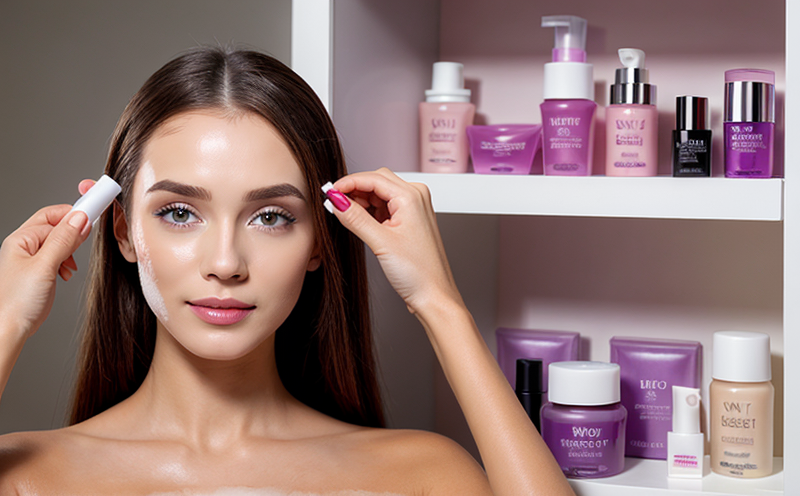Preservative Efficacy (Challenge) Testing in Cosmetics
In the realm of consumer products and product safety testing, ensuring that personal care products are free from microbial contamination is paramount. Preservatives play a critical role in extending the shelf life of cosmetics by inhibiting the growth of microorganisms such as bacteria, fungi, and yeast. However, the effectiveness of these preservatives must be rigorously tested to ensure they meet regulatory requirements and effectively protect against spoilage.
Preservative Efficacy (Challenge) Testing in Cosmetics involves exposing a sample of the product under controlled conditions designed to mimic real-world scenarios where contamination might occur. This method challenges the preservative system within the cosmetic formulation by inoculating it with specific microorganisms, allowing for an accurate assessment of the preservative's effectiveness.
The process typically begins with the selection of appropriate test organisms that are relevant to the product type and geographic region. Common organisms include Staphylococcus aureus, Pseudomonas aeruginosa, and Candida albicans. Once selected, these organisms are inoculated into the cosmetic sample at predetermined concentrations.
The samples are then incubated under conditions that simulate storage environments. These can include various temperatures (such as 25°C for three months or 37°C for one month), humidity levels, and light exposure. The test environment is carefully controlled to replicate typical storage and usage conditions encountered by the consumer.
After incubation, the samples are visually inspected for any signs of microbial growth. Microbiological analysis using techniques like plate counts or PCR-based methods may also be employed to quantify the presence of microorganisms. The results provide a clear indication of whether the preservative has effectively inhibited microbial growth and thus protected the product.
This testing is crucial not only for ensuring product safety but also for maintaining consumer trust. Regulatory bodies such as the European Commission, FDA, and Cosmetics Europe have stringent guidelines regarding the use of preservatives in cosmetics. Compliance with these regulations can significantly impact a company's reputation and market standing.
Quality and Reliability Assurance
Ensuring the quality and reliability of preservative efficacy testing is essential to provide consistent, accurate results that meet international standards. Our laboratory employs advanced microbiological techniques and state-of-the-art equipment to conduct these tests with precision and repeatability.
- Precision Instruments: We use high-precision analytical balances, pH meters, and viscometers to ensure accurate measurements of ingredients and product characteristics.
- Sterile Facilities: Our laboratories are designed with sterile rooms and laminar flow hoods to prevent contamination during sample preparation and testing.
The reliability of our results is further enhanced by strict adherence to international standards such as ISO 17635:2018, ASTM F2319-14, and EN 14560. These standards provide a framework for conducting microbiological testing in cosmetics, ensuring that the tests are consistently performed across different laboratories.
We also maintain a robust quality management system that includes regular internal audits and external calibration checks to ensure our equipment is operating within specified tolerances. This commitment to quality assurance ensures that every test result can be trusted by regulatory bodies and industry stakeholders alike.
International Acceptance and Recognition
- ISO Standards: Our preservative efficacy testing meets the stringent requirements of ISO standards such as ISO 17635:2018, which provides a comprehensive framework for microbiological testing in cosmetics.
- FDA Compliance: We are fully compliant with FDA regulations governing the use and labeling of preservatives in cosmetics. Our tests ensure that products meet these stringent requirements.
The international recognition we receive from regulatory bodies such as the European Commission, Cosmetics Europe, and the US Food and Drug Administration (FDA) underscores the quality and reliability of our testing services. This global acceptance ensures that your products are not only safe but also market-ready in diverse regions.
Competitive Advantage and Market Impact
- Innovation Support: By ensuring the efficacy of preservatives, our testing service supports product innovation. This allows companies to develop products that meet stringent safety standards while maintaining a competitive edge.
- Consumer Trust: Products that pass rigorous preservative efficacy tests are more likely to gain consumer trust and loyalty. This is particularly important in the highly competitive cosmetics market where brand reputation can significantly impact sales.
In today's global marketplace, regulatory compliance and safety assurance are not just legal requirements but also key differentiators that drive market success. By partnering with us for preservative efficacy testing, companies can ensure their products meet all necessary standards while maintaining a strong competitive presence in the market.





